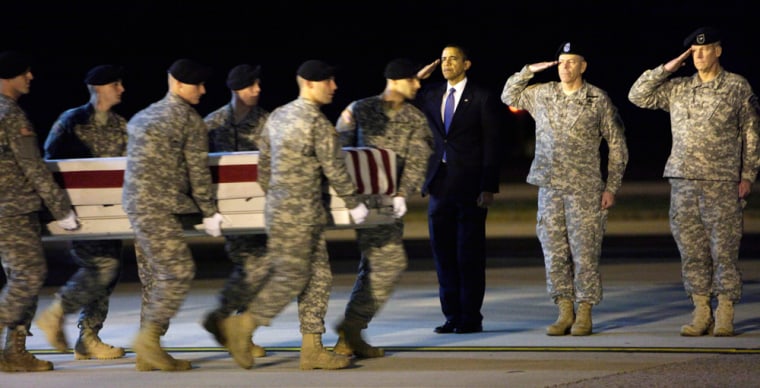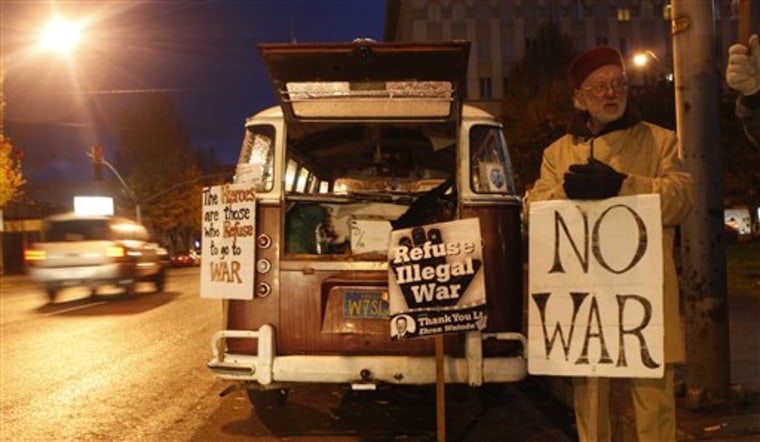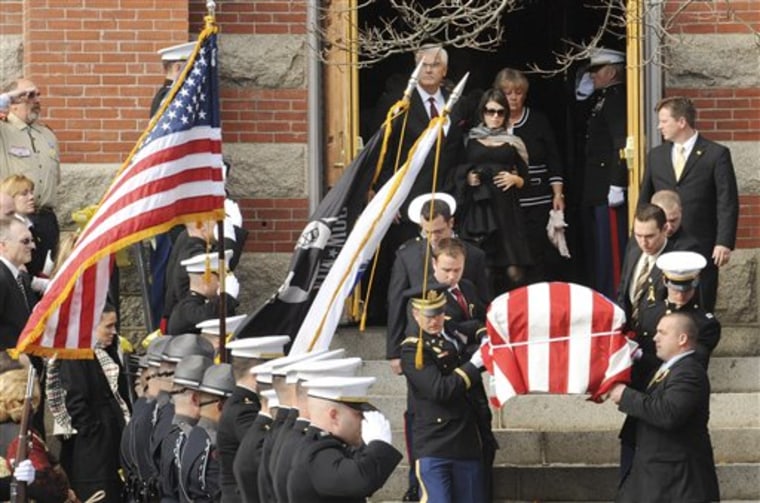Every afternoon, seven days a week, Ed Epley has a 5 p.m. appointment with the war.
He pulls a protest sign from his maroon 1961 Volkswagen van and joins a one-hour peace vigil at the Benton County courthouse in Corvallis, Ore. Epley has been doing this, day in and day out, since the U.S. launched its first air strikes on Afghanistan on Oct. 7, 2001.
"I really don't look at it as a job, it's just part of the daily task of being a citizen," says the 73-year-old retiree.
More than eight years later, this small, 365-day-a-year vigil may seem quixotic. But it stands apart for another reason: It has kept a steadfast focus on the war. Even though hundreds of thousands of troops have served, even though more than 800 members of the military have died, the marathon war in Afghanistan has, for long stretches, been off the nation's radar.
But one terrible month changed all that.
A record number of deaths in October forced the nation to take new notice of Afghanistan as debate raged over whether President Barack Obama should send tens of thousands more troops there.
The deaths of 62 Americans — including three federal agents — in ambushes, roadside bombs and helicopter crashes turned a spotlight on an often overlooked reality: The war is forever shaping lives here.
In the month of October, that was painfully clear as young children learned their fathers were gone; as young men who not long ago donned high school football uniforms were mourned; as some soldiers came home, and others prepared to leave for a war that began its ninth year.
In these 31 days, the war rippled across America.
IN AFGHANISTAN, AN AMBUSH ...
The attack was quick and brazen.
With guns, rocket-propelled grenades and mortar shells, hundreds of insurgents stormed a remote U.S.-Afghan outpost deep in the mountains of northeast Afghanistan. They attacked simultaneously from three sides — a mosque, buildings and a perch on high ground in the Kamdesh district.
The fighting at Combat Outpost Keating lasted almost six hours. When the deadliest battle in more than a year was over, scores of insurgents were dead, but so were eight Americans and three Afghan soldiers; 24 other Americans were among the injured.
The dead Americans were based at Fort Carson, Colo., members of the Fourth Brigade Combat Team, which already has suffered staggering losses in Iraq.
What happened that first Saturday in October was soon felt in homes from Applegate, Calif., to Kincheloe, Mich., to Lovettsville, Va.
By time October was over, the losses would expand to 28 states.
IN NEW JERSEY, A ROLL CALL ...
In the quiet of his office at Temple Emanu-El in Westfield, N.J., Rabbi Douglas Sagal devotes part of each Friday afternoon to the war.
Using a Department of Defense Web site, he gathers a weekly list of those who died in Afghanistan and Iraq and reads their names at Friday night services just before the Kaddish, the prayer for the dead.
"It came out of my belief that really the great sin of our time, maybe the great sin of our generation is we send people to war and we insist on living our lives as if nothing is happening," he says. "I made a promise to myself that we are going to know the names of those who have died in the service of our country."
IN DELAWARE, A SALUTE ...
Inside the cavernous C-17 transport plane, Capt. Pete Hudlow had a solemn — and unforgettable — glimpse of the cost of war.

On a chilly pre-dawn morning in late October, the Air Force captain was part of an extraordinary scene that unfolded in the darkness at Air Force Mortuary at Dover Air Force Base. The president had arrived to honor 18 of the war dead being returned home.
As much of the nation slept, Hudlow, a 40-year-old captain from Tinker Air Force Base (he's on temporary assignment) walked through the cargo area, verified the identifications, checked on the American flags covering the metal transfer cases and made sure all were in the proper order to be removed. Then, honor guard teams escorted the fallen off the plane.
"It's a somber thing when it's one of the fallen," he adds. "But it's a little bit more emotional when you go into the aircraft, it has no cargo, and on the floor there are 20-something cases. ... It's humbling. It's got some sadness.
"We do what we're tasked to do. We give them the dignity and honor as best we can."
The last soldier carried off was Sgt. Dale Griffin of Terre Haute, Ind. (His family was the only one that allowed the media to photograph the return.)
At the bottom of the ramp, the president offered a crisp salute.
At 4 a.m., Hudlow's mission was over.
"There was a sense of accomplishment," he says. "We got these guys back on American soil."
IN CONNECTICUT, A TRIBUTE ...
Capt. Benjamin Sklaver's contributions reached halfway around the world.
Though he was just 32, the Army reservist already had launched his own nonprofit clean water organization, worked on refugee health issues for the U.S. Centers for Disease Control and Prevention and built wells in Uganda, where one villager dubbed him "Moses Ben."
The rabbi at his funeral called Sklaver "a warrior for peace."
Sklaver, killed Oct. 2 by a suicide bomber, founded the ClearWater Initiative after returning from service in 2007 in northern Uganda. As part of a civil affairs unit there, he helped bring clean water to villages, building wells and creating protected springs in area where pregnant women and children suffered from dysentery and malaria.
"He believed in simple solutions," says David Abraham, his graduate school roommate. "He saw water as a way to give people hope."
Friends say Sklaver was trying to meet with local leaders outside Kandahar when he was killed. "He would tell me it was a dangerous place but he said, 'We're making progress. We'll get there,'" Abraham says.
His friends will carry on his organization, which aims to provide fresh water to 250,000 people within 10 years.
Still, they can't help wonder what might have been with Ben at the helm.
"We'll never see," Abraham says, "what ideas he would have brought back from Afghanistan."
IN MASSACHUSETTS, A TOWN MOURNS ...
The yellow ribbons appeared almost immediately around light poles and trees in North Attleboro, Mass. So, too, did the U.S. flags and lawn signs that read: "Rest Easy, Capt. Kyle Van De Giesen."
In a town of 28,000, the death of a war hero is deeply personal. Folks remembered the little boy who dreamed of flying, the star quarterback they cheered on Friday nights, the charismatic Marine whose jokes made everyone laugh.
"This was a big blow to the town," says Mike Kirby, editor of The Sun Chronicle and next door neighbor of the Van De Giesens. "He triumphed at everything he did in life."
Van De Giesen, 29, was killed Oct. 26 in a helicopter crash in Afghanistan.
North Attleboro paid tribute with a candlelight vigil. Folks also lined the streets, clutching American flags as his funeral procession wound its way past his house, his schools and the football field where, as a Red Rocketeer, he'd scored many touchdowns.
It was particularly poignant for Kirby.
He had attended Van De Giesen's high school and college graduation parties, his Marine pinning ceremony party, his wedding and his daughter's baptism more than a year ago. At that time, Kirby says, Van De Giesen — who had served two tours in Iraq — told him he'd asked to go to Afghanistan. "I signed up to defend my country," he said.
He was killed on his last mission before he was to head home to welcome the birth of his second child, Colin Joseph. The baby arrived four days after his father's funeral, on the day Van De Giesen was supposed to reunite with his family.
"To die under these circumstances," Kirby says, "it's just much too much."
IN VERMONT, A COUNTDOWN ...
Her husband has just left home to prepare for his second tour in Afghanistan and Betsy Charlesworth is wondering what it will mean for their year-old son, Marty.
How, she wonders, will he react when his father returns after being away a year?
"I said to Rob ... 'Marty is not going to know you and he may be afraid of you.' It breaks my heart," she says.
They'll be in touch by phone and Web cam, but Betsy says, "I am fully prepared for him (Marty) to look at Rob and say, 'Who are you and why are you in my house?' ... That's probably the toughest thing."
Rob Charlesworth, a 39-year-old lieutenant colonel in the Vermont National Guard, flew to Fort Polk, La., at the end of October.
He'll return for the holidays, but they've already prepared for his departure: Rob has written his will. She has adopted his 11-year-son, Myles, from a previous marriage.
Betsy tries to remember the lessons of her husband's first tour in 2003 — they were just dating then — when he told her not to panic every time she heard about trouble in Afghanistan.
Still, Betsy knows Afghanistan is "a scary place."
"People ask me, 'Why don't you tell your husband to get out of the Army? You have three children. He could die.' But this is his passion," she says. ... "I just pray that he comes home safe and sound and we're all family again."
IN LOUISIANA, READYING FOR TOUR NO. 4 ...
Col. Will Roy knows exactly what his 83-year-old father thinks about his fourth tour to Afghanistan.
"My dad keeps saying, 'You've done enough. You've done enough," says the 49-year-old colonel who arrived in Fort Polk, La., in October to prepare for his deployment.
Roy will lead the 86th Infantry Brigade Combat Team, which has more than 3,000 soldiers, about half from the Vermont National Guard. It will train and mentor Afghan security forces.
Roy says he reminds his father, Henry, of his service in the Marines in the Pacific during World War II and how he was away for five years. "So what I'm doing — there is no comparison," Roy says.
But he does appreciate his father's angst.
When his own son, Adam, now 22, was deployed to Afghanistan — he returned last summer — they had a final phone call, where he told the young man he was proud of him, urged him to keep his head down and do the right thing.
Then he called his elderly father and said, "'Hey, Poppy, I really didn't understand what you were going through. Now I get it.'"
IN OREGON, THE VIGIL GOES ON...
Meanwhile, Ed Epley is still at the county courthouse in Corvallis.
He's among 8 to 12 vigil regulars who gather from 5 p.m. to 6 p.m. — weekends and holidays included.
Mike Beilstein, a city council member, comes by occasionally. He helped launch the vigil when he brought a "Peace on Earth" sign to the courthouse the day after the first air strikes on Afghanistan.

"We never feel we're wrong, but we've asked ourselves is this the best way to address the issue," Beilstein says. "The question has been there from the start and it's there now, but now that we've been doing it, how do we quit?"
Most days, about 10 people or fewer show up. When there's an anniversary or big announcement — including events tied to the Iraq, which also is part of the protest — the numbers grow.
The protesters have endured angry shouts and name-calling, but they've also been greeted with peace signs, letters and honks of support.
As for the future?
"I don't know what the signal is going to be to say, 'Let's call it quits,'" Epley says. "We never thought we'd be here this long."
